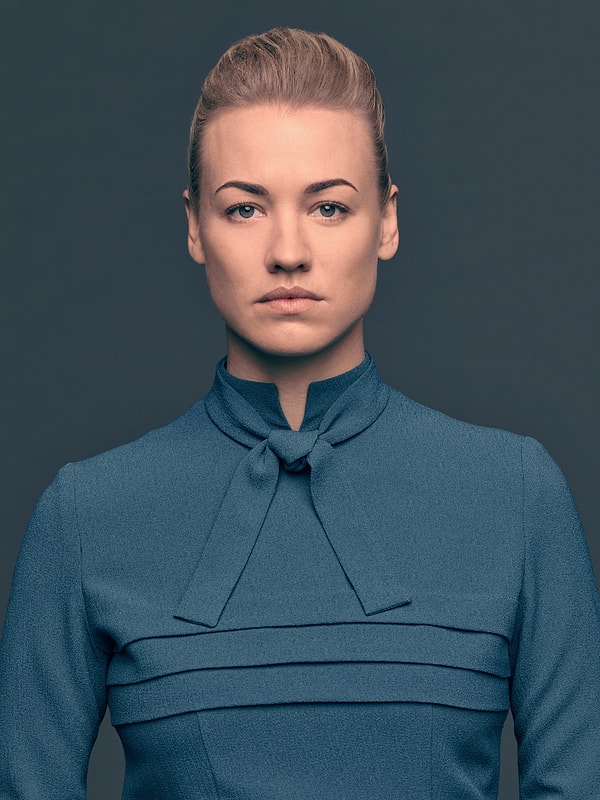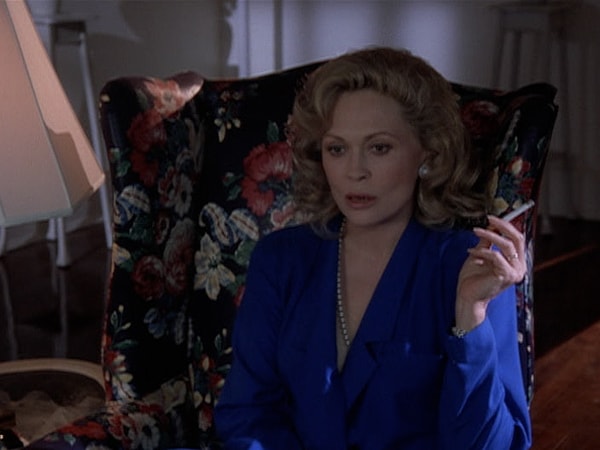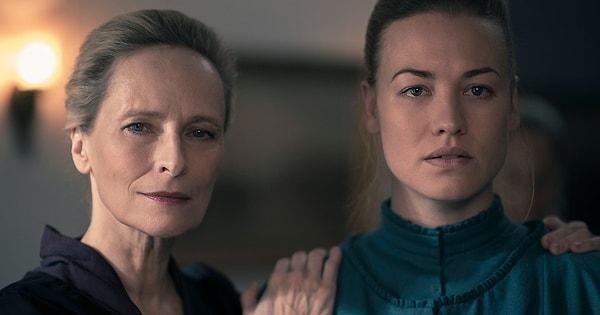A Portrait of Evil: Who is Serena Joy in 'The Handmaid's Tale' and What Drives Her?
Warning: This article does not go over events that occur in seasons 4 or 5, but it does touch on material found in previous seasons.
The author of The Handmaid's Tale, Margaret Atwood, has the extraordinary ability to bring life to the abstract. She forces the audience to confront things that normally couldn't be put into words. We bask in the smell of genesis in Janine's birthing chamber. We learn what it feels like to be stuck in solitary confinement. We see the struggles of a high-ranking daughter growing up in Gilead, and we come face to face with true evil.
That's one thing Atwood understands better than anything else: evil. She sticks it under a microscope, tells us to stare into the lens. Then she holds our heads down, forcing us to confront it until we simply cannot bear to keep watching. It's because she understands something most of us have yet to comprehend. Gilead is our fault.
Our fault.
The system was thought up by men and women who betray themselves and those around them. There's the complacency, the progressives who should've been standing in the marching line with Moira and Holly and the rest of the collective, and then there's those who betray their own kind. They devote everything that they are to fundamentalism and the patriarchal power structure.
These are the women who are so self-deluded, so vicious that they can beat their slaves while calling themselves the righteous elect--God's chosen, held above the rest of humanity.
Serena has always represented those women and their puzzling motivations. She's the embodiment of the mindset that causes us to justify burning a peaceful world to the ground. To many, she is an enigma. We can't fathom what could possibly turn a woman like her into the monster she's become. She's too despicable, too twisted. It doesn't seem realistic.
But The Handmaid's Tale does an amazing job of showing us where she comes from and what she is. The show has everything we need to understand this beast and the forces she embodies, and it all makes perfect sense. We just have to grab a magnifying glass and go over the material.

Where Warren Jeffs meets the runway. Courtesy of Hulu
It's About Power Not Principles
In the time before, Serena was an author, activist, and political pundit--almost like a 17th century Anne Coulter. She believed that women needed to understand their role in society, which is why she wrote a book called A Woman's Place, where she outlined her own brand of what she called domestic feminism. Like many modern sexists, she was repackaging her ideas to appeal to a generation who had grown tired of tight-lipped Phyllis Schlafly, pink-haired Jan Crouch, and the rest of their ilk.
The idea was that there was power in accepting one's role. She was often quoted as saying, 'Never mistake a woman's meekness for weakness.' It was manipulative. She found a way to turn women against themselves, and it worked.
But she didn't really believe anything she wrote, and that was obvious given the way she conducted her personal life. She did try to have a child. Fred and Serena would have liaisons whenever they had a break from work. They would pray and ask God to bless their union. But she didn't confine herself to her rightful place in the kitchen. She traveled the country, promoting herself and her fascist ideology. She gave speeches and made appearances.
She spun lies for the sake of gaining influence. We see this time and time again--her power plays with Fred behind the scenes, acting as de facto commander while he was in the hospital, and her push to speak at the Sons of Jacob conference before the coup.
There are many scenes where we see Serena talking about her career, her book, and the place she once held in society. She cherished it. When she's forced to throw it out, it's like she's trashing her firstborn's baby pictures.
The fact that she was unable to write under the regime broke her heart. It was the one thing that caused her to question Gilead. It's almost endearing until we look at the fact that her writing was just a means to an end. She doesn't really care about her craft. She misses the power and influence that came along with it. She used to be somebody, and now she's not. She is a defeated woman, a theme we keep coming back to time and time again.

Serena for the older generation. 1990 film. Nothing like Yvonne. Courtesy of Hulu
There's nothing true or beautiful there. Her blond wavy curls and simple smile are a hook, meant to pull us in and make us feel like we're seeing a woman of substance, worthy of pity, compassion, and even admiration. She does yoga. She loves gardening, and at times she seems relatable.
Yvonne Strahovski was picked for this role to reflect a new trend we see in fundamentalism today. There's flowery script, acoustic guitars, a trendy, elegant wardrobe, and wholesome, smiling Anglo-Saxons. It reminds us of pumpkin spice, orchids, and--dare we say it? Liberals. The TBN crowd might've traded their toupees and big glasses for scarves and peacoat jackets, but they're no better than they used to be.
With or without the teal, Serena is still thoroughly ruthless and completely bereft of morals.
Serena's experience on the college campus is a perfect example of the woman behind the moral code. She was run off by a group of protesters when she tries to give a speech in the time before. They called her a fascist and a nazi and refused to allow her to speak. She was able to quiet the crowd momentarily before being escorted away. She yelled about the birthrate and how they needed to act if they were going to save the human race. This mindset, along with her twisted version of feminism seems to be her main excuse for the evils of the regime.
While leaving the conference a man shot her in the stomach. When Fred visited her in the hospital, she told him to be a man. She didn't trust the police to do what needed to be done, and she wanted him to take action. He kills the shooter's wife in front of him.
She's supposed to be a fundamentalist powerhouse, holier than thou, and always ready to do the right thing. Someone like that would be forgiving and focusing on getting better. Instead, she has Fred play hitman for revenge.

Courtesy of Hulu
Serena's complete lack of morals and compassion are never more clear than in the theater flashback. In it, Serena and Fred decide to go to the movies so Fred can spend some time away from work. Before the film starts, he receives a text message saying that the Sons of Jacob will be moving forward with the slaughter of congress, just like 'we' proposed. It's unclear who he means when he says 'we,' but it's not the council. He proposed the measure to the council. It sounds like he's referring to Serena and himself.
Serena was known to pull the strings behind the scenes. It's likely she did in fact tell Fred to propose the coup. She doesn't care about bloodshed or violence. She just wants to further her goals and put herself in power. That's why when he talks about all of the suffering they would cause--including a literal holocaust--she dismisses it.
Serena uses her so-called beliefs as a means to an end. That is all. She might cling to them as a shield, hoping to fool herself and others into believing that she's a good person, but like many of her seemingly good qualities, they're just a facade.

Courtesy of Hulu
From Spoiled Brat To Barbie Hitler
When studying monsters like Serena, we often end up asking ourselves whether it was nature or nurture. Was Serena born that way or did something turn her into the vicious ice queen we see rampaging all over the screen? It's hard for viewers to understand how anyone could possibly be so ruthless. There must be a reason, and there is. But like many of the answers we get from the show, it's not spelled out for us. We have to read between the lines.
We also have to get inside her head. Serena's malice might be upfront, but her thoughts aren't. June probably understands her better than anyone else. Fred might be married to her, but he's selfish and interested mostly in himself. Rita is stricken with Stockholm, and Serena's mother, Pamela, doesn't want to hear it.
In season 3 episode 6, 'Household,' June has had enough. She thought she could trust Serena to do the right thing by Nichole. Serena knows that Gilead isn't safe for anyone, but she's so selfish that she's decided to run a massive campaign to bring Nichole back from Canada. June confronts her at the desecrated remains of the Lincoln Memorial in DC.
This is when the two recognize their irreconcilable differences.
June tells her that she can't love; she doesn't know how. She built Gilead, laying down the foundation for the nation's philosophy, just so she could have someone. Here we see Serena with her back turned tearing up. June was telling the truth. She has nobody. She's small. She's cruel, and she's empty. She will always be empty.
But why?
In season 4 episode 7, June sits down to talk to Mark Tuello, a spy for the American government. She tells him that Serena is driven by hatred and rage. She's a sociopath, and underneath it all, there's nothing but misery. June says she'll do anything to keep from feeling that way.
Where does that come from?

Courtesy of Hulu
Serena is an addict without a drug of choice. Like many people who are empty and miserable, she moves from one attachment to the next, clinging to Fred and Nichole, clinging to power, anything to keep herself from feeling that way. She doesn't care about Nichole, and she certainly doesn't care about her husband. Those are tools she uses because inside she is empty.
But why is she so vicious?
We finally get the answer to that in season 3 episode 3 'Useful (aka Watch Out)'. In it, Serena and Rita go to visit her mother Pamela in her home on the coast. Serena has just burned her down her family home after a moment indingation and resentment, and she's wrestling with her feelings about her marriage.
Pamela looks more like a spider than a human. It's like she's hiding insect legs under her widow's costume, and her true form will burst out at any moment. We wouldn't have it any other way.
When Serena goes to talk to Pamela about what happened with Fred, Pamela won't hear it. She calls Serena a selfish child, alluding to the fact that Serena gave Nichole away. Serena is hysterical, and she is in fact acting like a child. She's in an environment where emotions and weakness aren't allowed.
It's so utterly repressive and devoid of compassion that it's easy to see why Serena acts the way she does on the show. She's smothered, and she has to scream, kick, fight, anything to express what she's feeling.
Pamela meets that with pure disdain. You can really feel the hate coming off this woman. Her child is a spoiled brat, and she knows it.
Here we also get a glimpse of where Serena gets her twisted moral code. Like many of us, she takes the morals she was given. It's all cultural. We believe what we're told as children, and we define our principles around that. That's the way it works. Pamela tells her that women have no place in this world without their husbands. They're nothing.
Serena has also taken on her mother's belief that emotion is wrong. Don't throw hissy fits. Don't act out. Don't be human. Serena has two extremes existing at once inside her. There's the childish toddler throwing a tantrum, and there's the vicious crone, her inner mother, telling her to shut up and take it.
These two sides war, fighting against one another until she explodes, and she's transforming into a shrieking banshee, delivering tongue lashings like a medieval knight swinging a mace.
Her emptiness is self-sustaining, fed by Pamela's hatred for weakness. It will never go away. It's what Serena is now, a contradictory mess. She's too deluded to change. This is somebody who told herself that getting her finger cut off was an appropriate punishment under Gilead law.
But she has had many moments of clarity. We have given this character countless chances to accept the truth and reform, and she'd rather be a monster. How can you not hate someone like that?
Don't feel sorry for her.
Like June says, she is a consummate actress, capable of fooling herself into believing that she's just a wholesome woman who wants to better mankind. It is easy for the audience to get caught up. We want to believe that Serena can be good, but she isn't. She is a sociopath.

Courtesy of Hulu
Where Will Serena End Up
We've sat through all of Serena's hissy fits, her epic tongue lashings, and abusive episodes. Like Fred, there's something rotten inside her. She's a reoffender. Her son won't be enough to make her happy. Nothing, absolutely nothing, can fill that hole she carries around, and while she might be a good actress, that disgusting part of her has a way of shining through.
People will see who she is, and they will hate her for it. She might not be capable of obtaining the happy ending she's been seeking. It's hard to imagine a world that will accept her and love her, and she'll never find inner peace. Instead, she'll just keep hurting people over and over again.
Without going over any spoilers, the showrunners have talked about Serena's fate. They've said that in a just universe she would never get to live happily with her child, or even keep him. If the universe really does have a balance sheet, the child will be ripped from her arms while she's freaking out just like June.
It's funner when Serena's upset. We love to see her bawl and scream. Sometimes when she cries, she gets so hyterical she makes funny noises. It's like watching a toddler trying to one-up themselves. It's just as fun when she's vulnerable, protesting, and begging. There's something amazing about seeing the tables turned, having June grab her by the chin bend down and yell, 'Do you understand me!' Just like Serena did when she was holding June captive in their upstairs room. This is someone who has thoroughly earned a dose of their own medicine.
When we consider how fun it is to see Serena suffer, it's hard to imagine the show disappointing us with a happy life, either in Canada or Gilead. She should in prison or get shipped off to a Magdalene colony. She doesn't belong in a giant Victorian home, living like a queen. She doesn't deserve love, and it doesn't sound like the audience will be satisfied if that's allowed to happen.
We need justice, and I think we'll get it. It'll probably be one of the best moments in the series. We'll just have to wait and see. Whatever fate they devise will probably be sweeter than anything we can come up with, and The Handmaid's Tale has definitely given us a lot of ideas.
Keşfet ile ziyaret ettiğin tüm kategorileri tek akışta gör!

Send Comment